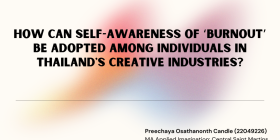Research summary
How can self-awareness of ‘burnout’ be adopted among individuals in Thailand’s creative industries?
According to the survey and interviews that I have done with people who work in creative industries in Thailand,
Burnout is the most common problem, and I found the culture of working in Thailand made people have burnout more.
These are the cultural identities that we have…
- hierarchical of job positions (power imbalances)
- age and generational gap
- workload and salary do not match
- tasks the client assigns are not creative enough
- work overtime

My previous interventions included art therapy workshops, creative social nights, and creative journals.
They all taught me that people have different ways of coping with themselves and expressing their feelings. Some people reported that the intervention they attend helps them know more about themselves and their burnout.
But I wonder whether they will continue doing this after interventions or not because if they continue, it can show that this thing can help them.

Everything leads to the last intervention in Unit 4.’Expressive writing: Burnout topic.’
In my feedback form, I asked participants, ‘Will you continue with Expressive Writing in the future or not?’
I didn’t ask this question before in my previous interventions.
Two of them said, ‘Maybe’.
Four of them will continue writing.
One of them won’t continue.
She reported, ‘I prefer talking to people more, so I think I’ll go in that direction instead.’
Even she said, ‘Writing it out makes me aware of how we truly feel.’

Intervention results can answer my research question. [especially the last intervention]
With many tools I provide, self-awareness of burnout can be achieved in many ways, depending on the people.
I want to improve the activities to be more onsite for interaction and to observe more behaviours. Also, a longitudinal time horizon for data collection can be used so the research can show how people develop their thoughts and feelings through time changes.
Wattanapume, my expert, suggests creating a shared power space that organises pain-sharing sessions and provides group support. Bosses can listen, and employees can speak freely. People will become more aware when they can express their feelings, share their experiences, and meet others who have faced similar challenges.
…
I am thankful to all the stakeholders and experts involved in my six interventions.
Thitipat Ruamsap, a counsellor and art therapist, helped me from the very beginning.
Wattanapume Laisuwanchai, my expert who helped me with the ideas
Chanaradee Chatrakul Na Aydhya
Pla Thananpaphat Tipruk
Kaitoon Punyaruk Baingern
Praew Kamonluk Kubota
Numpu
Nonthapat Cholavit
People who helped me in interventions both in Bangkok and London
Tan, Punch, Kendo, Wild, Ploy, Ae, Arielle, P’Mind, and Rada
All of my family, friends, and Josh
This research can’t be done without all of you.
